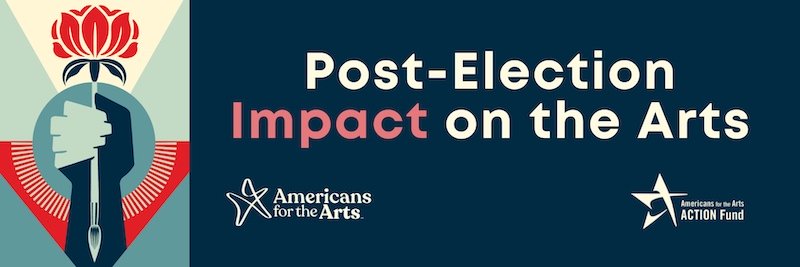The 2024 Federal election results will reshape arts and culture priorities and funding.
That’s the sobering new reality explained in “Post-Election Impact on the Arts,” a webinar sponsored by the Americans for the Arts and the Arts Action Fund. Host Nina Ozlu Tunceli, the organization’s executive director, and guest presenters analyzed what’s ahead for the arts and culture sector across America, where the arts community should focus advocacy activities, and opportunities and challenges that lie ahead in the 119th Congress
The November 21 webinar included discussions on what to expect during the lame-duck Congressional session, the incoming Trump Administration, how the makeup of Congress has changed following the 2024 election, and the advocacy outlook going into 2025. Webinar speakers reviewed new Congressional leadership and incoming political appointments as well as an analysis of new state and local government officials and ballot initiatives from across the country.

 Key takeaway: The arts should get ready for major shifts as well as an unknown period of uncertainty as new priorities are developed by the incoming Administration and sorted out with Republican control of the House and Senate effective in early January.
Key takeaway: The arts should get ready for major shifts as well as an unknown period of uncertainty as new priorities are developed by the incoming Administration and sorted out with Republican control of the House and Senate effective in early January.
A major question: Who might or will be allies on arts and cultural issues in the new Congress? Both the House and Senate have arts and cultural caucuses. DC does not have full representation in the House or Senate, which makes elected officials from Maryland and Virginia key to the DMV theater region.
Other key issues include the uncertainty of overall Federal Government funding once the current Continuing Resolution expires on December 20, 2024, and the unknown continuation of special funding earmarks placed by Congress.
A major matter specific to the DMV area with its large Federal employee population: How will the incoming Administration move forward with the recommendations of the newly announced Department of Government Efficiency? There have been a myriad of news articles and policy statements about reductions of the Federal workforce and government programs as a top priority. The Federal workforce may or will be impacted by RIFs (Reductions in Force), removals by other means, forced geographic relocations from the DMV, and the development and implementation of a new Schedule F category for more senior career Federal staff. Schedule F would allow the Executive Branch to take action to remove career staff more quickly than previously. There could also be Executive Orders that will affect government workers and Federal government-funded programs. All this can lead to constant disruption in the lives of Federal workers, of whom there are about 282,000 in the area. DC alone is home to 7.3 percent of the Federal workforce; Virginia, 6.6 percent; and Maryland, 6.4 percent.
Also serious: State arts funding is projected to decline. State legislative appropriations to the 56 State and Special Jurisdiction Arts Agencies are projected to decrease 5.8 percent from $575.6 million in 2025 (down from $611.1 million in 2024), according to new research published by the National Assembly of State Arts Agencies.
The webinar recording is below. The slides are downloadable here.
SEE ALSO:
What will happen to DMV theater in the next four years? (opinion by David Siegel, November 13, 2024)
